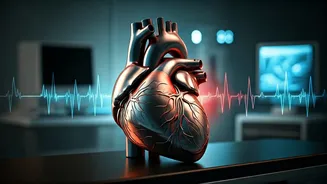Noise's Cardiovascular Impact
The auditory experience during Diwali can be a double-edged sword. Research indicates a notable association between elevated noise levels and an increased
incidence of cardiovascular issues. Several studies support the contention that prolonged exposure to loud sounds, whether from traffic or festive firecrackers, could significantly raise the probability of experiencing cardiac events. Investigations involving those living in louder environments have revealed a startling statistic: a 72% higher risk of suffering a heart attack in contrast to those dwelling in areas with lower decibel levels. This highlights the hidden danger of noise pollution, especially during times of high auditory activity.
Who Is Most Vulnerable?
Specific populations are at heightened risk when exposed to the intense sounds of Diwali celebrations. Individuals already contending with pre-existing heart conditions are particularly susceptible. These people may find that the sudden increase in noise can strain their cardiovascular systems, potentially leading to adverse events. Besides, the elderly and pregnant women should be considered when looking at people most at risk. High blood pressure and diabetes also become aggravating factors. Therefore, special considerations must be taken for those groups to ensure a safe and festive Diwali experience.
Physiological Reactions Explored
Loud noises can trigger significant physiological responses within the body. The sudden, intense sounds of firecrackers can set off the body's stress response, leading to a cascade of effects. Blood pressure and heart rate often spike under such conditions, as the body releases stress hormones. Continuous exposure to high noise levels can lead to the inflammation and oxidative stress, compounding these risks. Research indicates that noise levels above 55 decibels during the day and 45 decibels at night can lead to an increase in blood pressure.
Practical Safety Measures
Protecting your heart health during Diwali involves several precautionary measures. Reducing direct exposure to loud firecrackers is a key step. Consider spending time in quieter locations or using noise-canceling headphones when exposed to loud environments. Monitoring blood pressure and staying hydrated can also help in managing the impact of stress on the cardiovascular system. Additionally, maintaining a balanced diet and regular exercise is vital for heart health, especially during celebrations that might otherwise promote unhealthy habits. Be prepared and take care.


















